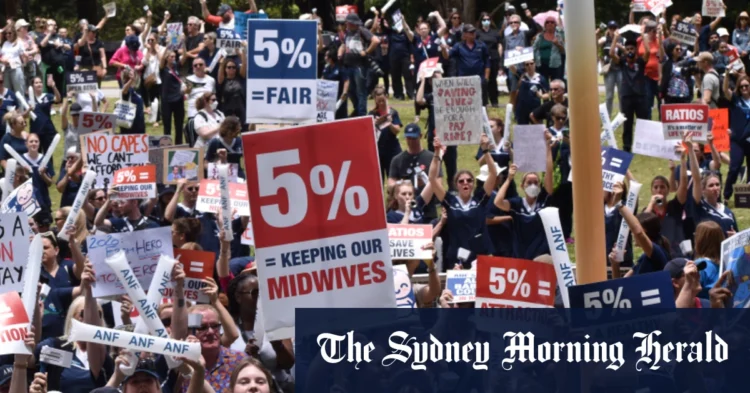By Martin Cole-
The union for Western Australia’s nurses and midwives has received a record $350,000 fine for a strike outside state parliament last year that attracted thousands of nurses at the height of a bitter dispute over pay and conditions.
The fine follows the violation of the state’s Industrial Relations Commission (IRC) after it had ordered the union not to strike, but the Australian Nursing Federation ignored the order and went ahead with the strikes.
They ahd gathered on the steps of parliament in November last year, the crowd of thousands of nurses, including some who had left work, demanded a 5 per cent pay rise.
However, the government refused to cave into their demands to raise its latest pay offer of an increase between 3 and 4.5 per cent.
WA’s Australian Nursing Federation (ANF) could have faced a fine as large as $36 million for 3,590 individual breaches alleged by the IRC’s registrar.
The two sides last month agreed to an overall fine of less than 1 per cent of that figure at $350,000, with ANF secretary Janet Reah to personally pay a $10,000 fine for failing to appear before the commission on the day of the strike.
The final decision on the fine rested with the IRC, which today agreed with both sides and imposed the $350,000 fine against the union and a $10,000 fine for Ms Reah.
Financial records lodged with the IRC last year showed the ANF was $4.5 million in surplus.
Fines of significant amounts can impose a substantial financial burden on unions. The union may have to allocate resources and funds towards paying the fine, which could impact their ability to support their members or carry out other activities.
The huge fine is expected to serve as a deterrent for unions and their members to engage in future strikes or industrial action. The fear of financial penalties may discourage workers from exercising their right to strike, potentially weakening their bargaining power in labor disputes.
Impact on labor relations: Fines for strikes can strain the relationship between the union, its members, and the employer. It may create an atmosphere of mistrust and animosity, making it challenging to foster constructive dialogue and reach mutually beneficial agreements in the future.
The Australia governments or employers are expected to use these fines as a precedent to introduce stricter regulations or limitations on labour actions, affecting the overall labour movement
Speaking after the penalty was handed down, Ms Reah said the fine against her alone was twice as much as what the entire teachers’ union received after a strike in 2008.
“Clearly the industrial landscape has changed and this fine is acting as a warning and deterrent to other unions when considering industrial action going forward,” she said.
Handing down the $350,000 fine, Chief Commissioner Stephen Kenner said deterring both the ANF and other unions from breaching the commission’s orders in future was an important consideration.
He said the ANF’s defiance of the order to call off the strike was “at the most extreme end” of breaches, describing the union’s actions as “belligerent non-compliance”.
“The public nature of the calculated and wilful course of conduct by the ANF, which was prosecuted vigorously through the media, including print, digital, radio and television and various social media outlets, made the conduct manifestly worse,” he said.
During hearings last month, the IRC was told 338 elective surgeries and 350 out-patient appointments were cancelled as a result of the strike, but it was not known how that compared to normal days.
“That the state health system responded to the state-wide strike by triggering the Department of Health disaster response mechanism, in and of itself, speaks volumes as to the seriousness criterion in this case,” Chief Commissioner Kenner wrote in his reasons.
“The fact that those engaged in crisis management of the health system avoided the disastrous consequences of the strike is a credit to those involved.”
Lawyers for the commission’s registrar had last month said a significant penalty was needed to prevent the ANF, or other unions, seeing breaching the orders as “part and parcel” of industrial campaigns – an idea Chief Commissioner Kenner agreed with.
At the time, the IRC also suggested it may require the union to promise to follow the law in the future, potentially leaving it liable to a greater penalty if it were to breach the commission’s orders again.
But the ANF’s lawyer, Tim Hammond, said the union would only commit to abiding by the commission’s orders for the duration of the current pay and conditions dispute.
Industrial dispute unresolved
That dispute is still dragging on, more than six months after the rally outside parliament.
Despite the government and ANF still not agreeing on a new pay and conditions deal, the government last year promised to pay nurses the pay rise of between 3 and 4.5 per cent.
That pay increase has already been accepted by about three-quarters of public sector workers, although disputes are continuing with firefighters and police as well.
The government is also starting work to implement nurse-to-patient ratios, beginning with Perth Children’s Hospital.
Health Minister Amber-Jade Sanderson last month called on the ANF to sign a pay and conditions deal so ratios could be properly implemented.




